Contemporary Business Environment: A Case Study of TESCO's OB
VerifiedAdded on 2023/01/12
|11
|3682
|42
Report
AI Summary
This report provides an analysis of the contemporary business environment and its impact on organisational behaviour, focusing on TESCO, a multinational retail chain headquartered in the UK. It examines both economic and non-economic factors influencing TESCO's operations, including economic systems, conditions, and policies, as well as natural environment, demographics, and cultural aspects. The report includes a SWOT analysis to identify TESCO's strengths, weaknesses, opportunities, and threats, and a PESTLE analysis to assess the impact of political, economic, social, technological, legal, and environmental factors. The discussion covers how these factors affect TESCO's productivity, market position, and organisational behaviour. The report concludes with recommendations aimed at enhancing TESCO's strategic approach to navigate the challenges and leverage the opportunities within its business environment, with a focus on maintaining stability and competitive advantage.
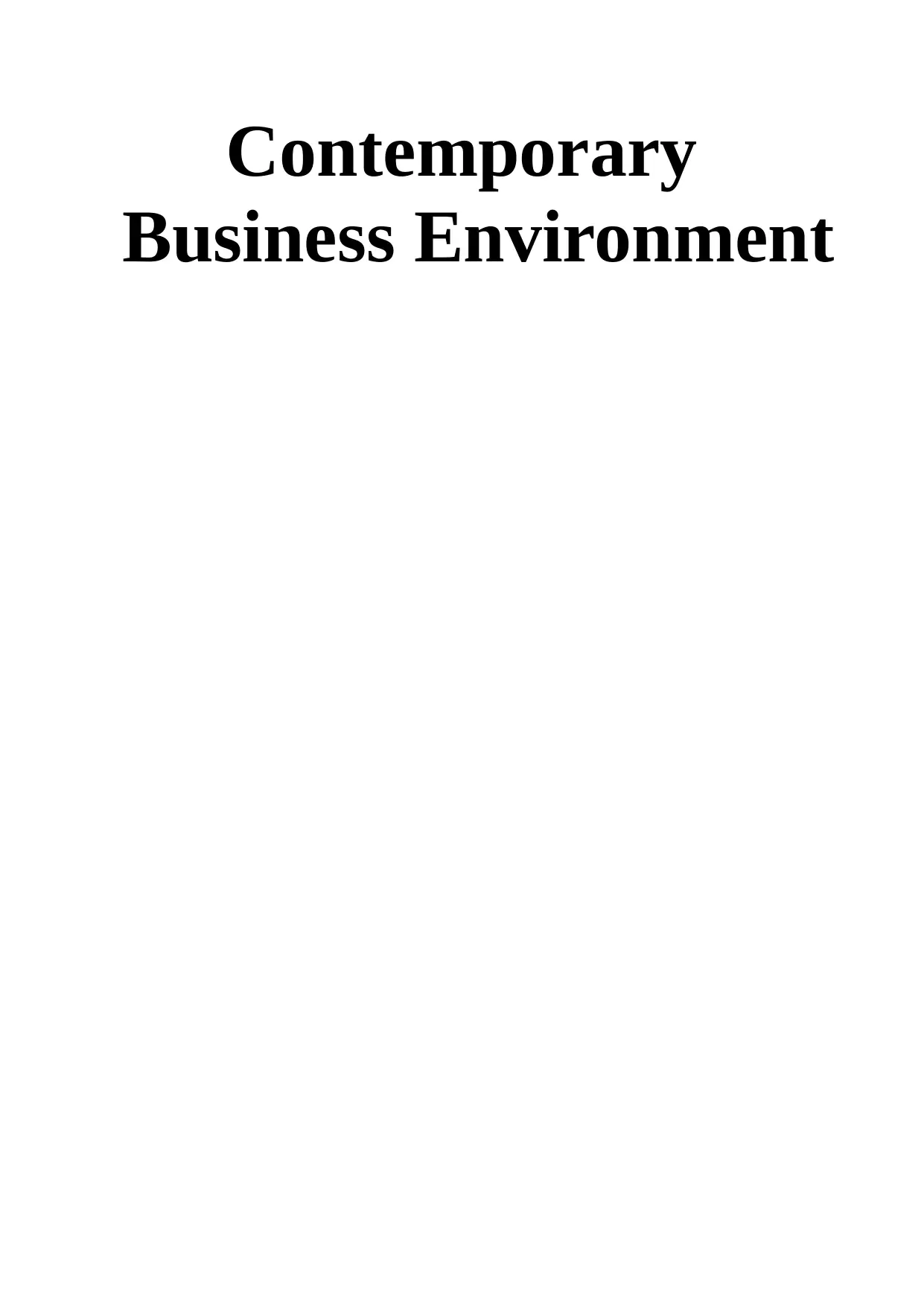
Contemporary
Business Environment
Business Environment
Paraphrase This Document
Need a fresh take? Get an instant paraphrase of this document with our AI Paraphraser
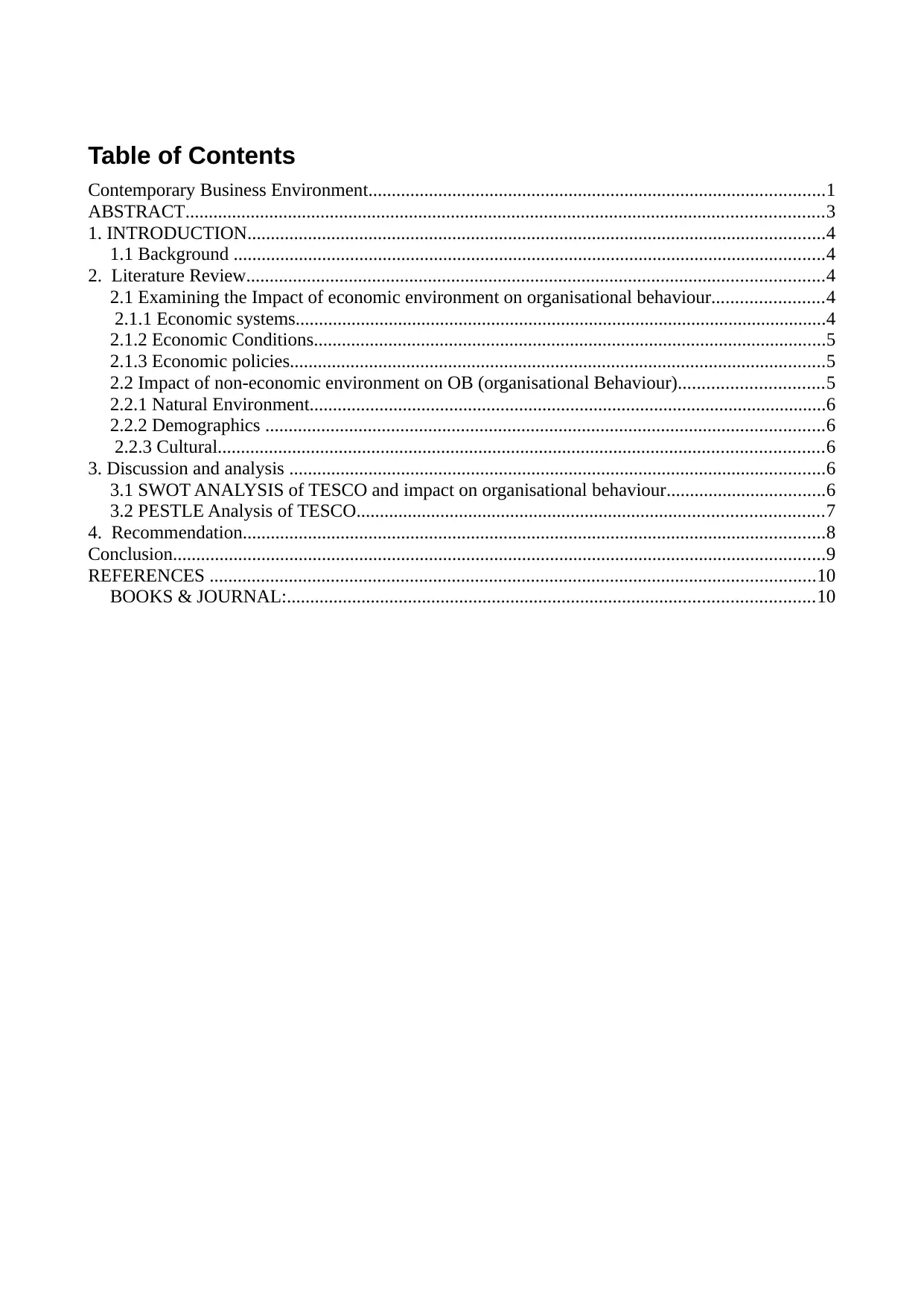
Table of Contents
Contemporary Business Environment..................................................................................................1
ABSTRACT.........................................................................................................................................3
1. INTRODUCTION............................................................................................................................4
1.1 Background ...............................................................................................................................4
2. Literature Review............................................................................................................................4
2.1 Examining the Impact of economic environment on organisational behaviour........................4
2.1.1 Economic systems..................................................................................................................4
2.1.2 Economic Conditions..............................................................................................................5
2.1.3 Economic policies...................................................................................................................5
2.2 Impact of non-economic environment on OB (organisational Behaviour)...............................5
2.2.1 Natural Environment...............................................................................................................6
2.2.2 Demographics ........................................................................................................................6
2.2.3 Cultural..................................................................................................................................6
3. Discussion and analysis ...................................................................................................................6
3.1 SWOT ANALYSIS of TESCO and impact on organisational behaviour..................................6
3.2 PESTLE Analysis of TESCO....................................................................................................7
4. Recommendation.............................................................................................................................8
Conclusion............................................................................................................................................9
REFERENCES ..................................................................................................................................10
BOOKS & JOURNAL:.................................................................................................................10
Contemporary Business Environment..................................................................................................1
ABSTRACT.........................................................................................................................................3
1. INTRODUCTION............................................................................................................................4
1.1 Background ...............................................................................................................................4
2. Literature Review............................................................................................................................4
2.1 Examining the Impact of economic environment on organisational behaviour........................4
2.1.1 Economic systems..................................................................................................................4
2.1.2 Economic Conditions..............................................................................................................5
2.1.3 Economic policies...................................................................................................................5
2.2 Impact of non-economic environment on OB (organisational Behaviour)...............................5
2.2.1 Natural Environment...............................................................................................................6
2.2.2 Demographics ........................................................................................................................6
2.2.3 Cultural..................................................................................................................................6
3. Discussion and analysis ...................................................................................................................6
3.1 SWOT ANALYSIS of TESCO and impact on organisational behaviour..................................6
3.2 PESTLE Analysis of TESCO....................................................................................................7
4. Recommendation.............................................................................................................................8
Conclusion............................................................................................................................................9
REFERENCES ..................................................................................................................................10
BOOKS & JOURNAL:.................................................................................................................10
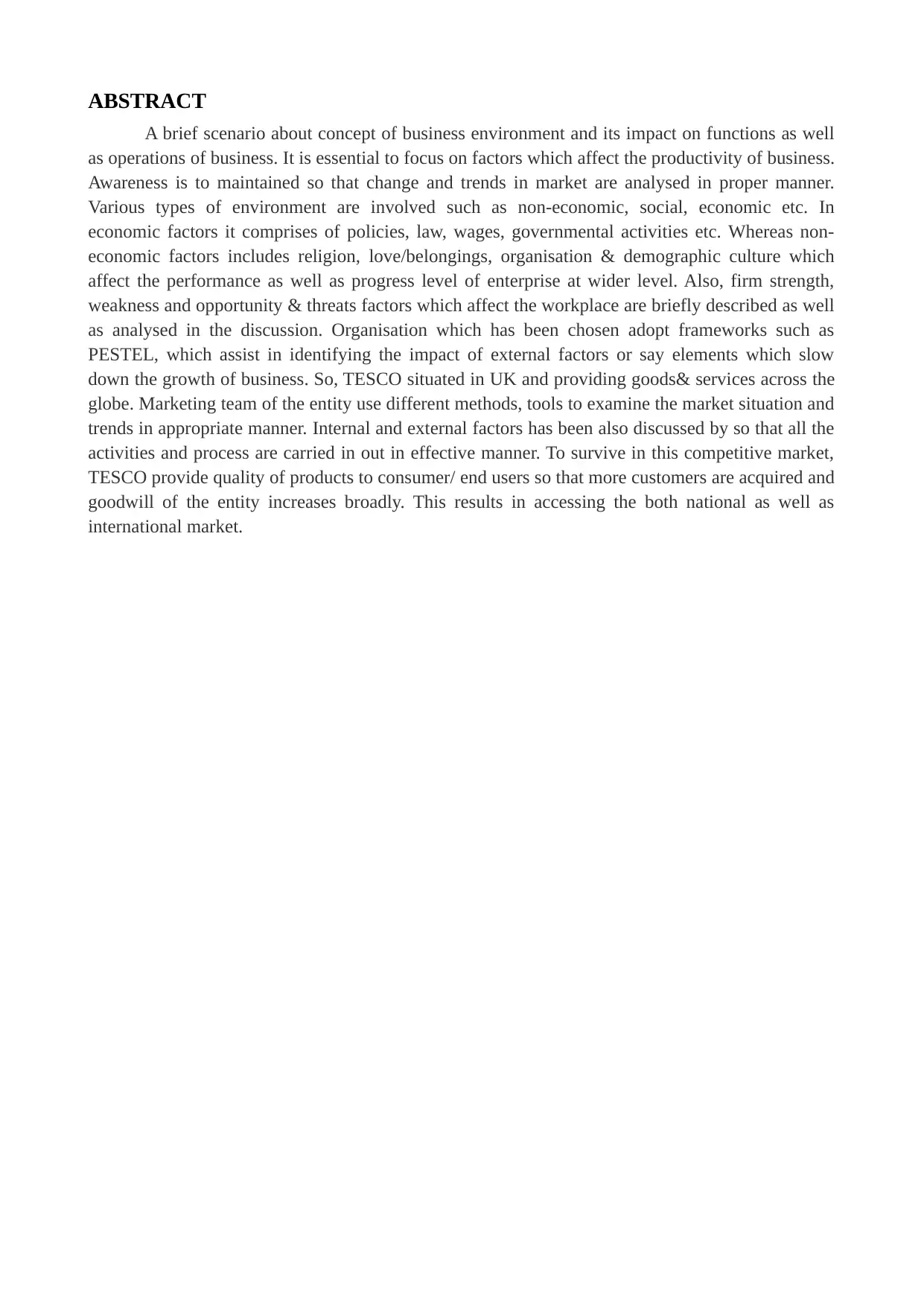
ABSTRACT
A brief scenario about concept of business environment and its impact on functions as well
as operations of business. It is essential to focus on factors which affect the productivity of business.
Awareness is to maintained so that change and trends in market are analysed in proper manner.
Various types of environment are involved such as non-economic, social, economic etc. In
economic factors it comprises of policies, law, wages, governmental activities etc. Whereas non-
economic factors includes religion, love/belongings, organisation & demographic culture which
affect the performance as well as progress level of enterprise at wider level. Also, firm strength,
weakness and opportunity & threats factors which affect the workplace are briefly described as well
as analysed in the discussion. Organisation which has been chosen adopt frameworks such as
PESTEL, which assist in identifying the impact of external factors or say elements which slow
down the growth of business. So, TESCO situated in UK and providing goods& services across the
globe. Marketing team of the entity use different methods, tools to examine the market situation and
trends in appropriate manner. Internal and external factors has been also discussed by so that all the
activities and process are carried in out in effective manner. To survive in this competitive market,
TESCO provide quality of products to consumer/ end users so that more customers are acquired and
goodwill of the entity increases broadly. This results in accessing the both national as well as
international market.
A brief scenario about concept of business environment and its impact on functions as well
as operations of business. It is essential to focus on factors which affect the productivity of business.
Awareness is to maintained so that change and trends in market are analysed in proper manner.
Various types of environment are involved such as non-economic, social, economic etc. In
economic factors it comprises of policies, law, wages, governmental activities etc. Whereas non-
economic factors includes religion, love/belongings, organisation & demographic culture which
affect the performance as well as progress level of enterprise at wider level. Also, firm strength,
weakness and opportunity & threats factors which affect the workplace are briefly described as well
as analysed in the discussion. Organisation which has been chosen adopt frameworks such as
PESTEL, which assist in identifying the impact of external factors or say elements which slow
down the growth of business. So, TESCO situated in UK and providing goods& services across the
globe. Marketing team of the entity use different methods, tools to examine the market situation and
trends in appropriate manner. Internal and external factors has been also discussed by so that all the
activities and process are carried in out in effective manner. To survive in this competitive market,
TESCO provide quality of products to consumer/ end users so that more customers are acquired and
goodwill of the entity increases broadly. This results in accessing the both national as well as
international market.
⊘ This is a preview!⊘
Do you want full access?
Subscribe today to unlock all pages.

Trusted by 1+ million students worldwide
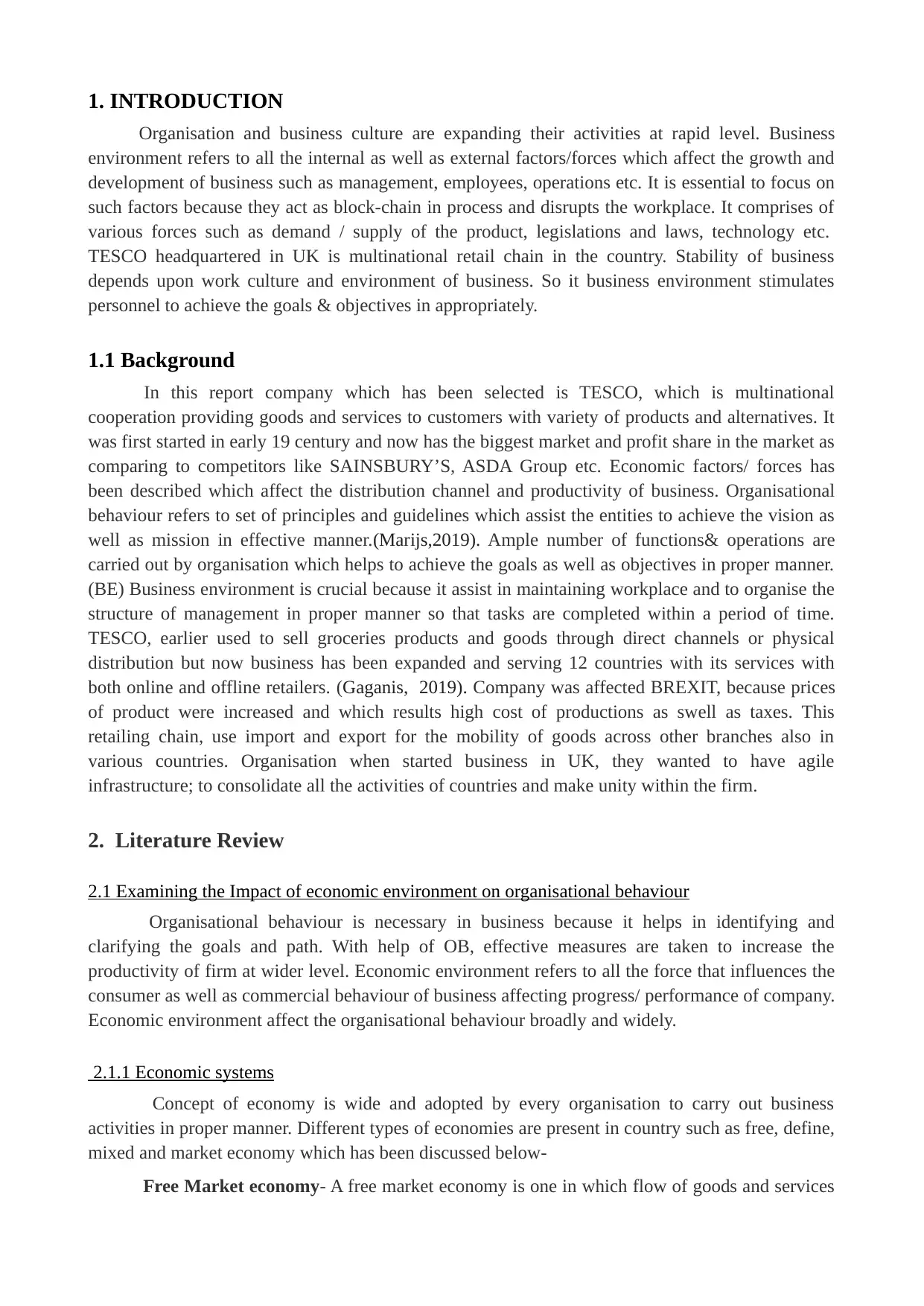
1. INTRODUCTION
Organisation and business culture are expanding their activities at rapid level. Business
environment refers to all the internal as well as external factors/forces which affect the growth and
development of business such as management, employees, operations etc. It is essential to focus on
such factors because they act as block-chain in process and disrupts the workplace. It comprises of
various forces such as demand / supply of the product, legislations and laws, technology etc.
TESCO headquartered in UK is multinational retail chain in the country. Stability of business
depends upon work culture and environment of business. So it business environment stimulates
personnel to achieve the goals & objectives in appropriately.
1.1 Background
In this report company which has been selected is TESCO, which is multinational
cooperation providing goods and services to customers with variety of products and alternatives. It
was first started in early 19 century and now has the biggest market and profit share in the market as
comparing to competitors like SAINSBURY’S, ASDA Group etc. Economic factors/ forces has
been described which affect the distribution channel and productivity of business. Organisational
behaviour refers to set of principles and guidelines which assist the entities to achieve the vision as
well as mission in effective manner.(Marijs,2019). Ample number of functions& operations are
carried out by organisation which helps to achieve the goals as well as objectives in proper manner.
(BE) Business environment is crucial because it assist in maintaining workplace and to organise the
structure of management in proper manner so that tasks are completed within a period of time.
TESCO, earlier used to sell groceries products and goods through direct channels or physical
distribution but now business has been expanded and serving 12 countries with its services with
both online and offline retailers. (Gaganis, 2019). Company was affected BREXIT, because prices
of product were increased and which results high cost of productions as swell as taxes. This
retailing chain, use import and export for the mobility of goods across other branches also in
various countries. Organisation when started business in UK, they wanted to have agile
infrastructure; to consolidate all the activities of countries and make unity within the firm.
2. Literature Review
2.1 Examining the Impact of economic environment on organisational behaviour
Organisational behaviour is necessary in business because it helps in identifying and
clarifying the goals and path. With help of OB, effective measures are taken to increase the
productivity of firm at wider level. Economic environment refers to all the force that influences the
consumer as well as commercial behaviour of business affecting progress/ performance of company.
Economic environment affect the organisational behaviour broadly and widely.
2.1.1 Economic systems
Concept of economy is wide and adopted by every organisation to carry out business
activities in proper manner. Different types of economies are present in country such as free, define,
mixed and market economy which has been discussed below-
Free Market economy- A free market economy is one in which flow of goods and services
Organisation and business culture are expanding their activities at rapid level. Business
environment refers to all the internal as well as external factors/forces which affect the growth and
development of business such as management, employees, operations etc. It is essential to focus on
such factors because they act as block-chain in process and disrupts the workplace. It comprises of
various forces such as demand / supply of the product, legislations and laws, technology etc.
TESCO headquartered in UK is multinational retail chain in the country. Stability of business
depends upon work culture and environment of business. So it business environment stimulates
personnel to achieve the goals & objectives in appropriately.
1.1 Background
In this report company which has been selected is TESCO, which is multinational
cooperation providing goods and services to customers with variety of products and alternatives. It
was first started in early 19 century and now has the biggest market and profit share in the market as
comparing to competitors like SAINSBURY’S, ASDA Group etc. Economic factors/ forces has
been described which affect the distribution channel and productivity of business. Organisational
behaviour refers to set of principles and guidelines which assist the entities to achieve the vision as
well as mission in effective manner.(Marijs,2019). Ample number of functions& operations are
carried out by organisation which helps to achieve the goals as well as objectives in proper manner.
(BE) Business environment is crucial because it assist in maintaining workplace and to organise the
structure of management in proper manner so that tasks are completed within a period of time.
TESCO, earlier used to sell groceries products and goods through direct channels or physical
distribution but now business has been expanded and serving 12 countries with its services with
both online and offline retailers. (Gaganis, 2019). Company was affected BREXIT, because prices
of product were increased and which results high cost of productions as swell as taxes. This
retailing chain, use import and export for the mobility of goods across other branches also in
various countries. Organisation when started business in UK, they wanted to have agile
infrastructure; to consolidate all the activities of countries and make unity within the firm.
2. Literature Review
2.1 Examining the Impact of economic environment on organisational behaviour
Organisational behaviour is necessary in business because it helps in identifying and
clarifying the goals and path. With help of OB, effective measures are taken to increase the
productivity of firm at wider level. Economic environment refers to all the force that influences the
consumer as well as commercial behaviour of business affecting progress/ performance of company.
Economic environment affect the organisational behaviour broadly and widely.
2.1.1 Economic systems
Concept of economy is wide and adopted by every organisation to carry out business
activities in proper manner. Different types of economies are present in country such as free, define,
mixed and market economy which has been discussed below-
Free Market economy- A free market economy is one in which flow of goods and services
Paraphrase This Document
Need a fresh take? Get an instant paraphrase of this document with our AI Paraphraser
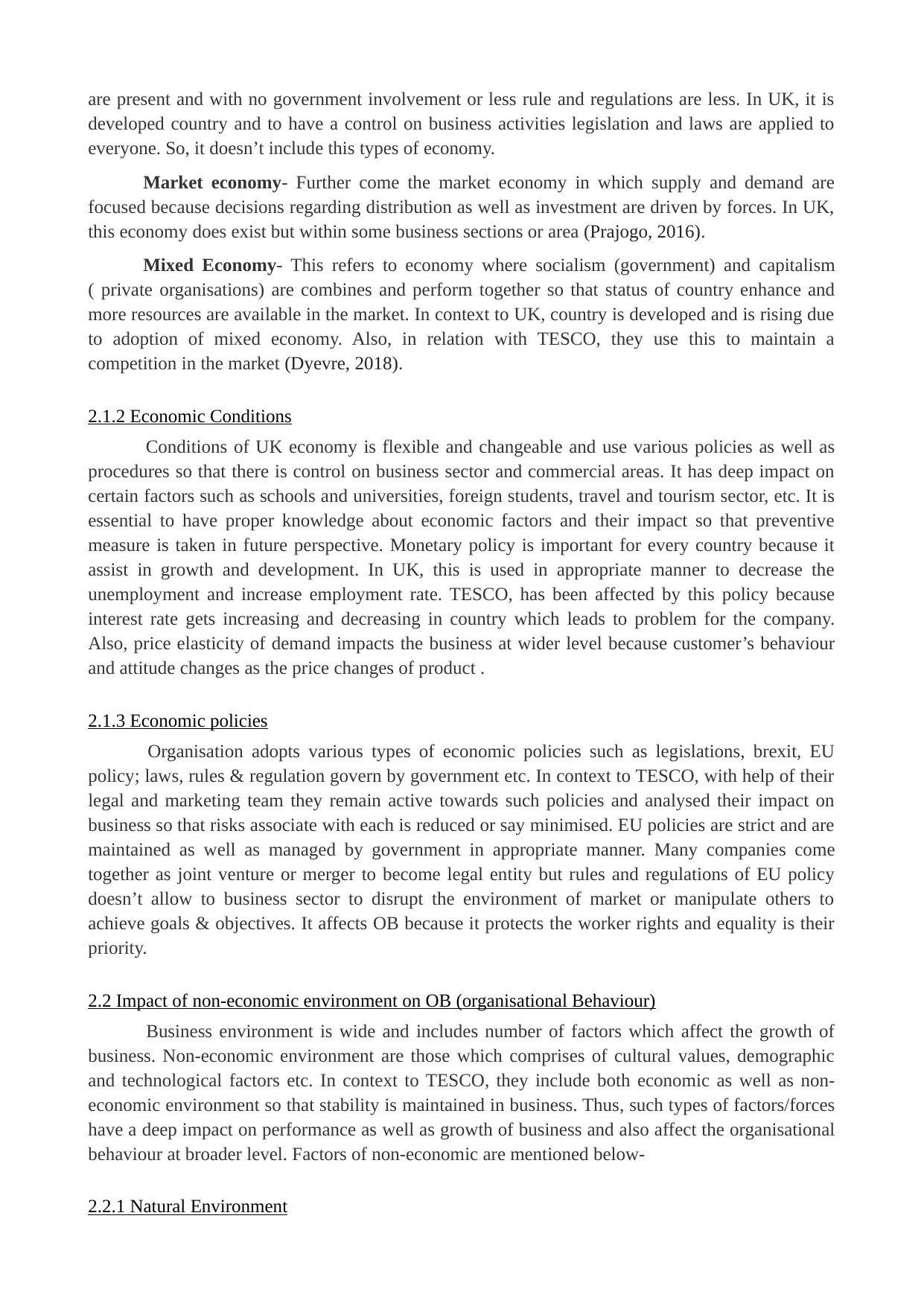
are present and with no government involvement or less rule and regulations are less. In UK, it is
developed country and to have a control on business activities legislation and laws are applied to
everyone. So, it doesn’t include this types of economy.
Market economy- Further come the market economy in which supply and demand are
focused because decisions regarding distribution as well as investment are driven by forces. In UK,
this economy does exist but within some business sections or area (Prajogo, 2016).
Mixed Economy- This refers to economy where socialism (government) and capitalism
( private organisations) are combines and perform together so that status of country enhance and
more resources are available in the market. In context to UK, country is developed and is rising due
to adoption of mixed economy. Also, in relation with TESCO, they use this to maintain a
competition in the market (Dyevre, 2018).
2.1.2 Economic Conditions
Conditions of UK economy is flexible and changeable and use various policies as well as
procedures so that there is control on business sector and commercial areas. It has deep impact on
certain factors such as schools and universities, foreign students, travel and tourism sector, etc. It is
essential to have proper knowledge about economic factors and their impact so that preventive
measure is taken in future perspective. Monetary policy is important for every country because it
assist in growth and development. In UK, this is used in appropriate manner to decrease the
unemployment and increase employment rate. TESCO, has been affected by this policy because
interest rate gets increasing and decreasing in country which leads to problem for the company.
Also, price elasticity of demand impacts the business at wider level because customer’s behaviour
and attitude changes as the price changes of product .
2.1.3 Economic policies
Organisation adopts various types of economic policies such as legislations, brexit, EU
policy; laws, rules & regulation govern by government etc. In context to TESCO, with help of their
legal and marketing team they remain active towards such policies and analysed their impact on
business so that risks associate with each is reduced or say minimised. EU policies are strict and are
maintained as well as managed by government in appropriate manner. Many companies come
together as joint venture or merger to become legal entity but rules and regulations of EU policy
doesn’t allow to business sector to disrupt the environment of market or manipulate others to
achieve goals & objectives. It affects OB because it protects the worker rights and equality is their
priority.
2.2 Impact of non-economic environment on OB (organisational Behaviour)
Business environment is wide and includes number of factors which affect the growth of
business. Non-economic environment are those which comprises of cultural values, demographic
and technological factors etc. In context to TESCO, they include both economic as well as non-
economic environment so that stability is maintained in business. Thus, such types of factors/forces
have a deep impact on performance as well as growth of business and also affect the organisational
behaviour at broader level. Factors of non-economic are mentioned below-
2.2.1 Natural Environment
developed country and to have a control on business activities legislation and laws are applied to
everyone. So, it doesn’t include this types of economy.
Market economy- Further come the market economy in which supply and demand are
focused because decisions regarding distribution as well as investment are driven by forces. In UK,
this economy does exist but within some business sections or area (Prajogo, 2016).
Mixed Economy- This refers to economy where socialism (government) and capitalism
( private organisations) are combines and perform together so that status of country enhance and
more resources are available in the market. In context to UK, country is developed and is rising due
to adoption of mixed economy. Also, in relation with TESCO, they use this to maintain a
competition in the market (Dyevre, 2018).
2.1.2 Economic Conditions
Conditions of UK economy is flexible and changeable and use various policies as well as
procedures so that there is control on business sector and commercial areas. It has deep impact on
certain factors such as schools and universities, foreign students, travel and tourism sector, etc. It is
essential to have proper knowledge about economic factors and their impact so that preventive
measure is taken in future perspective. Monetary policy is important for every country because it
assist in growth and development. In UK, this is used in appropriate manner to decrease the
unemployment and increase employment rate. TESCO, has been affected by this policy because
interest rate gets increasing and decreasing in country which leads to problem for the company.
Also, price elasticity of demand impacts the business at wider level because customer’s behaviour
and attitude changes as the price changes of product .
2.1.3 Economic policies
Organisation adopts various types of economic policies such as legislations, brexit, EU
policy; laws, rules & regulation govern by government etc. In context to TESCO, with help of their
legal and marketing team they remain active towards such policies and analysed their impact on
business so that risks associate with each is reduced or say minimised. EU policies are strict and are
maintained as well as managed by government in appropriate manner. Many companies come
together as joint venture or merger to become legal entity but rules and regulations of EU policy
doesn’t allow to business sector to disrupt the environment of market or manipulate others to
achieve goals & objectives. It affects OB because it protects the worker rights and equality is their
priority.
2.2 Impact of non-economic environment on OB (organisational Behaviour)
Business environment is wide and includes number of factors which affect the growth of
business. Non-economic environment are those which comprises of cultural values, demographic
and technological factors etc. In context to TESCO, they include both economic as well as non-
economic environment so that stability is maintained in business. Thus, such types of factors/forces
have a deep impact on performance as well as growth of business and also affect the organisational
behaviour at broader level. Factors of non-economic are mentioned below-
2.2.1 Natural Environment
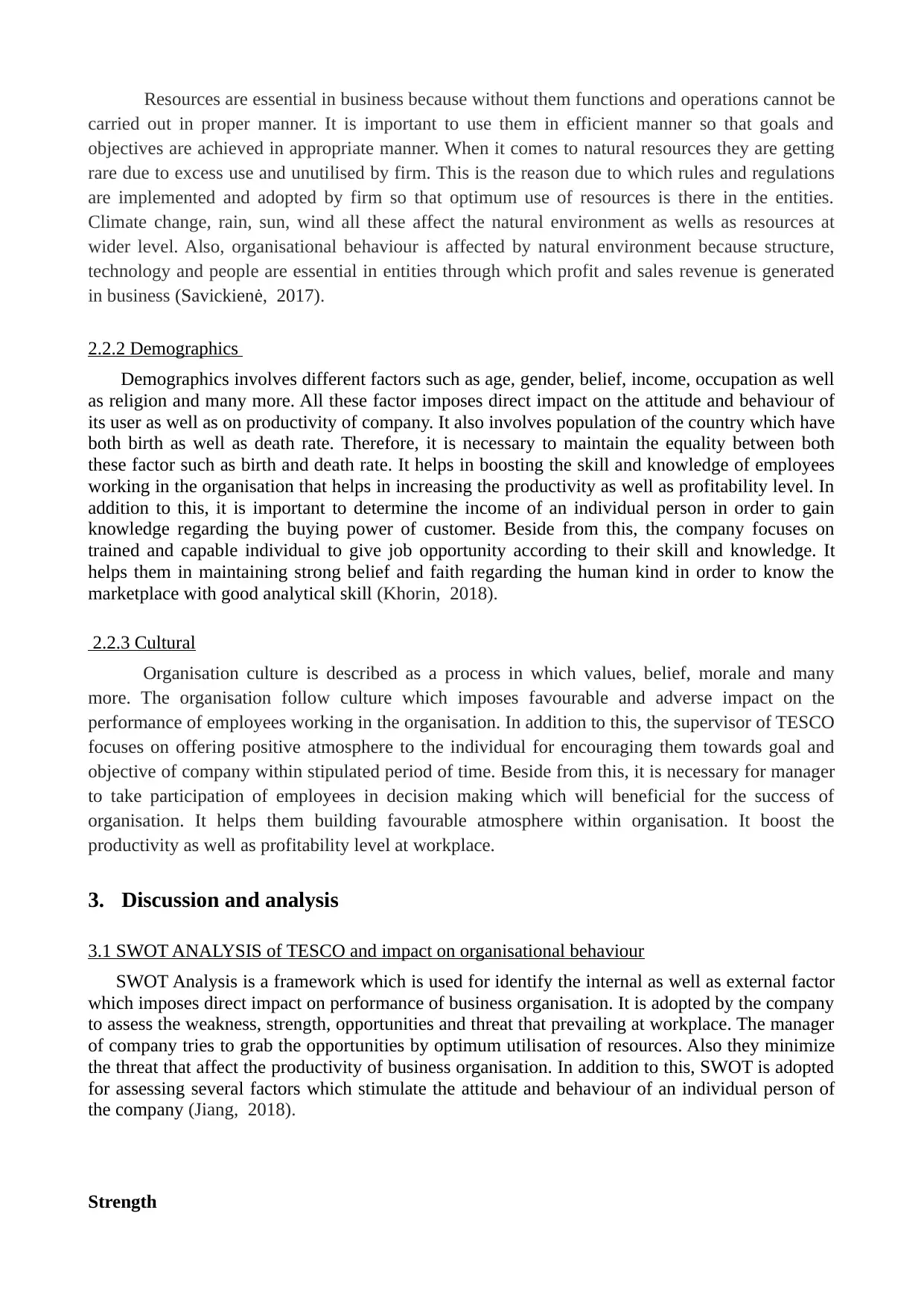
Resources are essential in business because without them functions and operations cannot be
carried out in proper manner. It is important to use them in efficient manner so that goals and
objectives are achieved in appropriate manner. When it comes to natural resources they are getting
rare due to excess use and unutilised by firm. This is the reason due to which rules and regulations
are implemented and adopted by firm so that optimum use of resources is there in the entities.
Climate change, rain, sun, wind all these affect the natural environment as wells as resources at
wider level. Also, organisational behaviour is affected by natural environment because structure,
technology and people are essential in entities through which profit and sales revenue is generated
in business (Savickienė, 2017).
2.2.2 Demographics
Demographics involves different factors such as age, gender, belief, income, occupation as well
as religion and many more. All these factor imposes direct impact on the attitude and behaviour of
its user as well as on productivity of company. It also involves population of the country which have
both birth as well as death rate. Therefore, it is necessary to maintain the equality between both
these factor such as birth and death rate. It helps in boosting the skill and knowledge of employees
working in the organisation that helps in increasing the productivity as well as profitability level. In
addition to this, it is important to determine the income of an individual person in order to gain
knowledge regarding the buying power of customer. Beside from this, the company focuses on
trained and capable individual to give job opportunity according to their skill and knowledge. It
helps them in maintaining strong belief and faith regarding the human kind in order to know the
marketplace with good analytical skill (Khorin, 2018).
2.2.3 Cultural
Organisation culture is described as a process in which values, belief, morale and many
more. The organisation follow culture which imposes favourable and adverse impact on the
performance of employees working in the organisation. In addition to this, the supervisor of TESCO
focuses on offering positive atmosphere to the individual for encouraging them towards goal and
objective of company within stipulated period of time. Beside from this, it is necessary for manager
to take participation of employees in decision making which will beneficial for the success of
organisation. It helps them building favourable atmosphere within organisation. It boost the
productivity as well as profitability level at workplace.
3. Discussion and analysis
3.1 SWOT ANALYSIS of TESCO and impact on organisational behaviour
SWOT Analysis is a framework which is used for identify the internal as well as external factor
which imposes direct impact on performance of business organisation. It is adopted by the company
to assess the weakness, strength, opportunities and threat that prevailing at workplace. The manager
of company tries to grab the opportunities by optimum utilisation of resources. Also they minimize
the threat that affect the productivity of business organisation. In addition to this, SWOT is adopted
for assessing several factors which stimulate the attitude and behaviour of an individual person of
the company (Jiang, 2018).
Strength
carried out in proper manner. It is important to use them in efficient manner so that goals and
objectives are achieved in appropriate manner. When it comes to natural resources they are getting
rare due to excess use and unutilised by firm. This is the reason due to which rules and regulations
are implemented and adopted by firm so that optimum use of resources is there in the entities.
Climate change, rain, sun, wind all these affect the natural environment as wells as resources at
wider level. Also, organisational behaviour is affected by natural environment because structure,
technology and people are essential in entities through which profit and sales revenue is generated
in business (Savickienė, 2017).
2.2.2 Demographics
Demographics involves different factors such as age, gender, belief, income, occupation as well
as religion and many more. All these factor imposes direct impact on the attitude and behaviour of
its user as well as on productivity of company. It also involves population of the country which have
both birth as well as death rate. Therefore, it is necessary to maintain the equality between both
these factor such as birth and death rate. It helps in boosting the skill and knowledge of employees
working in the organisation that helps in increasing the productivity as well as profitability level. In
addition to this, it is important to determine the income of an individual person in order to gain
knowledge regarding the buying power of customer. Beside from this, the company focuses on
trained and capable individual to give job opportunity according to their skill and knowledge. It
helps them in maintaining strong belief and faith regarding the human kind in order to know the
marketplace with good analytical skill (Khorin, 2018).
2.2.3 Cultural
Organisation culture is described as a process in which values, belief, morale and many
more. The organisation follow culture which imposes favourable and adverse impact on the
performance of employees working in the organisation. In addition to this, the supervisor of TESCO
focuses on offering positive atmosphere to the individual for encouraging them towards goal and
objective of company within stipulated period of time. Beside from this, it is necessary for manager
to take participation of employees in decision making which will beneficial for the success of
organisation. It helps them building favourable atmosphere within organisation. It boost the
productivity as well as profitability level at workplace.
3. Discussion and analysis
3.1 SWOT ANALYSIS of TESCO and impact on organisational behaviour
SWOT Analysis is a framework which is used for identify the internal as well as external factor
which imposes direct impact on performance of business organisation. It is adopted by the company
to assess the weakness, strength, opportunities and threat that prevailing at workplace. The manager
of company tries to grab the opportunities by optimum utilisation of resources. Also they minimize
the threat that affect the productivity of business organisation. In addition to this, SWOT is adopted
for assessing several factors which stimulate the attitude and behaviour of an individual person of
the company (Jiang, 2018).
Strength
⊘ This is a preview!⊘
Do you want full access?
Subscribe today to unlock all pages.

Trusted by 1+ million students worldwide
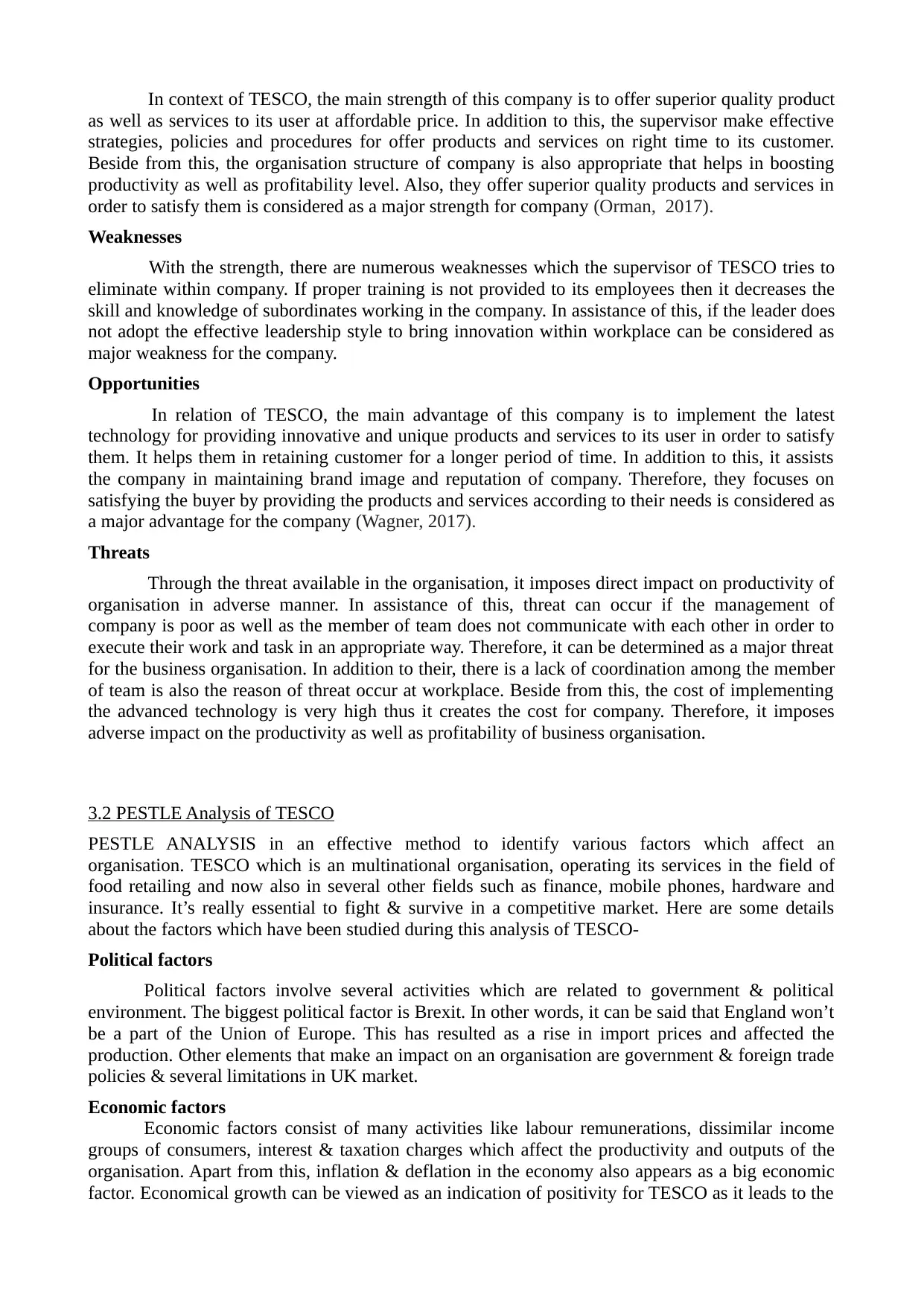
In context of TESCO, the main strength of this company is to offer superior quality product
as well as services to its user at affordable price. In addition to this, the supervisor make effective
strategies, policies and procedures for offer products and services on right time to its customer.
Beside from this, the organisation structure of company is also appropriate that helps in boosting
productivity as well as profitability level. Also, they offer superior quality products and services in
order to satisfy them is considered as a major strength for company (Orman, 2017).
Weaknesses
With the strength, there are numerous weaknesses which the supervisor of TESCO tries to
eliminate within company. If proper training is not provided to its employees then it decreases the
skill and knowledge of subordinates working in the company. In assistance of this, if the leader does
not adopt the effective leadership style to bring innovation within workplace can be considered as
major weakness for the company.
Opportunities
In relation of TESCO, the main advantage of this company is to implement the latest
technology for providing innovative and unique products and services to its user in order to satisfy
them. It helps them in retaining customer for a longer period of time. In addition to this, it assists
the company in maintaining brand image and reputation of company. Therefore, they focuses on
satisfying the buyer by providing the products and services according to their needs is considered as
a major advantage for the company (Wagner, 2017).
Threats
Through the threat available in the organisation, it imposes direct impact on productivity of
organisation in adverse manner. In assistance of this, threat can occur if the management of
company is poor as well as the member of team does not communicate with each other in order to
execute their work and task in an appropriate way. Therefore, it can be determined as a major threat
for the business organisation. In addition to their, there is a lack of coordination among the member
of team is also the reason of threat occur at workplace. Beside from this, the cost of implementing
the advanced technology is very high thus it creates the cost for company. Therefore, it imposes
adverse impact on the productivity as well as profitability of business organisation.
3.2 PESTLE Analysis of TESCO
PESTLE ANALYSIS in an effective method to identify various factors which affect an
organisation. TESCO which is an multinational organisation, operating its services in the field of
food retailing and now also in several other fields such as finance, mobile phones, hardware and
insurance. It’s really essential to fight & survive in a competitive market. Here are some details
about the factors which have been studied during this analysis of TESCO-
Political factors
Political factors involve several activities which are related to government & political
environment. The biggest political factor is Brexit. In other words, it can be said that England won’t
be a part of the Union of Europe. This has resulted as a rise in import prices and affected the
production. Other elements that make an impact on an organisation are government & foreign trade
policies & several limitations in UK market.
Economic factors
Economic factors consist of many activities like labour remunerations, dissimilar income
groups of consumers, interest & taxation charges which affect the productivity and outputs of the
organisation. Apart from this, inflation & deflation in the economy also appears as a big economic
factor. Economical growth can be viewed as an indication of positivity for TESCO as it leads to the
as well as services to its user at affordable price. In addition to this, the supervisor make effective
strategies, policies and procedures for offer products and services on right time to its customer.
Beside from this, the organisation structure of company is also appropriate that helps in boosting
productivity as well as profitability level. Also, they offer superior quality products and services in
order to satisfy them is considered as a major strength for company (Orman, 2017).
Weaknesses
With the strength, there are numerous weaknesses which the supervisor of TESCO tries to
eliminate within company. If proper training is not provided to its employees then it decreases the
skill and knowledge of subordinates working in the company. In assistance of this, if the leader does
not adopt the effective leadership style to bring innovation within workplace can be considered as
major weakness for the company.
Opportunities
In relation of TESCO, the main advantage of this company is to implement the latest
technology for providing innovative and unique products and services to its user in order to satisfy
them. It helps them in retaining customer for a longer period of time. In addition to this, it assists
the company in maintaining brand image and reputation of company. Therefore, they focuses on
satisfying the buyer by providing the products and services according to their needs is considered as
a major advantage for the company (Wagner, 2017).
Threats
Through the threat available in the organisation, it imposes direct impact on productivity of
organisation in adverse manner. In assistance of this, threat can occur if the management of
company is poor as well as the member of team does not communicate with each other in order to
execute their work and task in an appropriate way. Therefore, it can be determined as a major threat
for the business organisation. In addition to their, there is a lack of coordination among the member
of team is also the reason of threat occur at workplace. Beside from this, the cost of implementing
the advanced technology is very high thus it creates the cost for company. Therefore, it imposes
adverse impact on the productivity as well as profitability of business organisation.
3.2 PESTLE Analysis of TESCO
PESTLE ANALYSIS in an effective method to identify various factors which affect an
organisation. TESCO which is an multinational organisation, operating its services in the field of
food retailing and now also in several other fields such as finance, mobile phones, hardware and
insurance. It’s really essential to fight & survive in a competitive market. Here are some details
about the factors which have been studied during this analysis of TESCO-
Political factors
Political factors involve several activities which are related to government & political
environment. The biggest political factor is Brexit. In other words, it can be said that England won’t
be a part of the Union of Europe. This has resulted as a rise in import prices and affected the
production. Other elements that make an impact on an organisation are government & foreign trade
policies & several limitations in UK market.
Economic factors
Economic factors consist of many activities like labour remunerations, dissimilar income
groups of consumers, interest & taxation charges which affect the productivity and outputs of the
organisation. Apart from this, inflation & deflation in the economy also appears as a big economic
factor. Economical growth can be viewed as an indication of positivity for TESCO as it leads to the
Paraphrase This Document
Need a fresh take? Get an instant paraphrase of this document with our AI Paraphraser
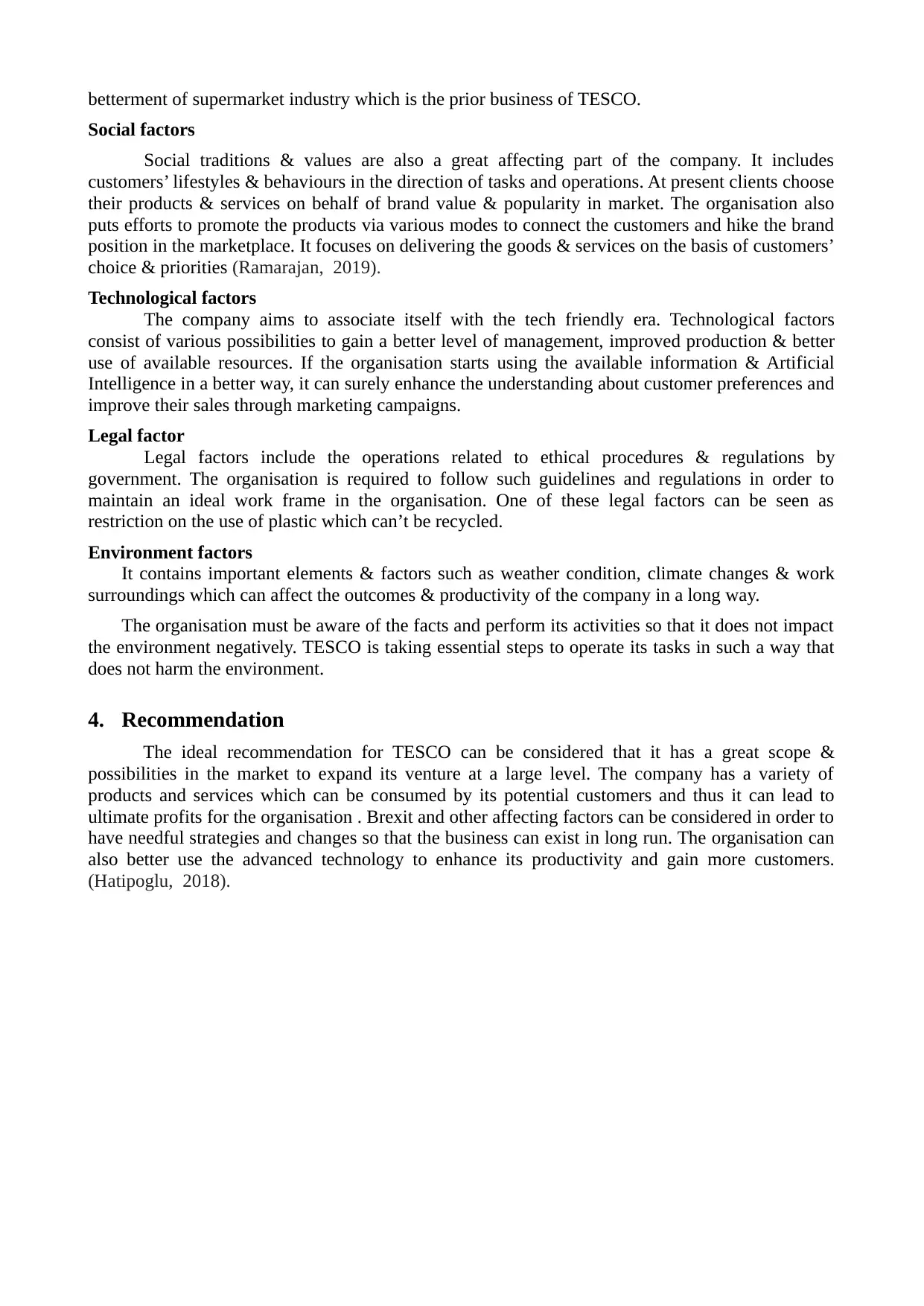
betterment of supermarket industry which is the prior business of TESCO.
Social factors
Social traditions & values are also a great affecting part of the company. It includes
customers’ lifestyles & behaviours in the direction of tasks and operations. At present clients choose
their products & services on behalf of brand value & popularity in market. The organisation also
puts efforts to promote the products via various modes to connect the customers and hike the brand
position in the marketplace. It focuses on delivering the goods & services on the basis of customers’
choice & priorities (Ramarajan, 2019).
Technological factors
The company aims to associate itself with the tech friendly era. Technological factors
consist of various possibilities to gain a better level of management, improved production & better
use of available resources. If the organisation starts using the available information & Artificial
Intelligence in a better way, it can surely enhance the understanding about customer preferences and
improve their sales through marketing campaigns.
Legal factor
Legal factors include the operations related to ethical procedures & regulations by
government. The organisation is required to follow such guidelines and regulations in order to
maintain an ideal work frame in the organisation. One of these legal factors can be seen as
restriction on the use of plastic which can’t be recycled.
Environment factors
It contains important elements & factors such as weather condition, climate changes & work
surroundings which can affect the outcomes & productivity of the company in a long way.
The organisation must be aware of the facts and perform its activities so that it does not impact
the environment negatively. TESCO is taking essential steps to operate its tasks in such a way that
does not harm the environment.
4. Recommendation
The ideal recommendation for TESCO can be considered that it has a great scope &
possibilities in the market to expand its venture at a large level. The company has a variety of
products and services which can be consumed by its potential customers and thus it can lead to
ultimate profits for the organisation . Brexit and other affecting factors can be considered in order to
have needful strategies and changes so that the business can exist in long run. The organisation can
also better use the advanced technology to enhance its productivity and gain more customers.
(Hatipoglu, 2018).
Social factors
Social traditions & values are also a great affecting part of the company. It includes
customers’ lifestyles & behaviours in the direction of tasks and operations. At present clients choose
their products & services on behalf of brand value & popularity in market. The organisation also
puts efforts to promote the products via various modes to connect the customers and hike the brand
position in the marketplace. It focuses on delivering the goods & services on the basis of customers’
choice & priorities (Ramarajan, 2019).
Technological factors
The company aims to associate itself with the tech friendly era. Technological factors
consist of various possibilities to gain a better level of management, improved production & better
use of available resources. If the organisation starts using the available information & Artificial
Intelligence in a better way, it can surely enhance the understanding about customer preferences and
improve their sales through marketing campaigns.
Legal factor
Legal factors include the operations related to ethical procedures & regulations by
government. The organisation is required to follow such guidelines and regulations in order to
maintain an ideal work frame in the organisation. One of these legal factors can be seen as
restriction on the use of plastic which can’t be recycled.
Environment factors
It contains important elements & factors such as weather condition, climate changes & work
surroundings which can affect the outcomes & productivity of the company in a long way.
The organisation must be aware of the facts and perform its activities so that it does not impact
the environment negatively. TESCO is taking essential steps to operate its tasks in such a way that
does not harm the environment.
4. Recommendation
The ideal recommendation for TESCO can be considered that it has a great scope &
possibilities in the market to expand its venture at a large level. The company has a variety of
products and services which can be consumed by its potential customers and thus it can lead to
ultimate profits for the organisation . Brexit and other affecting factors can be considered in order to
have needful strategies and changes so that the business can exist in long run. The organisation can
also better use the advanced technology to enhance its productivity and gain more customers.
(Hatipoglu, 2018).
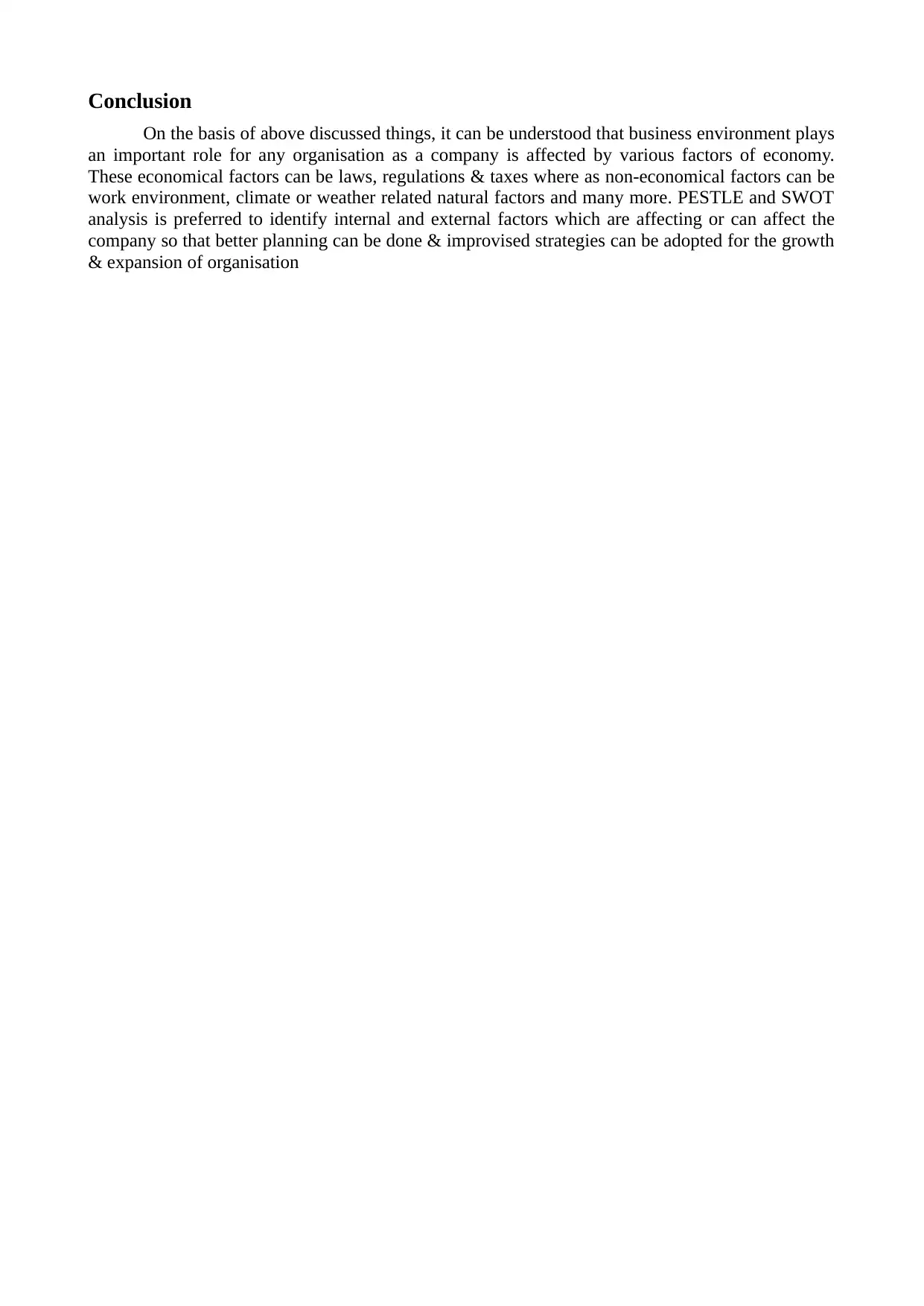
Conclusion
On the basis of above discussed things, it can be understood that business environment plays
an important role for any organisation as a company is affected by various factors of economy.
These economical factors can be laws, regulations & taxes where as non-economical factors can be
work environment, climate or weather related natural factors and many more. PESTLE and SWOT
analysis is preferred to identify internal and external factors which are affecting or can affect the
company so that better planning can be done & improvised strategies can be adopted for the growth
& expansion of organisation
On the basis of above discussed things, it can be understood that business environment plays
an important role for any organisation as a company is affected by various factors of economy.
These economical factors can be laws, regulations & taxes where as non-economical factors can be
work environment, climate or weather related natural factors and many more. PESTLE and SWOT
analysis is preferred to identify internal and external factors which are affecting or can affect the
company so that better planning can be done & improvised strategies can be adopted for the growth
& expansion of organisation
⊘ This is a preview!⊘
Do you want full access?
Subscribe today to unlock all pages.

Trusted by 1+ million students worldwide
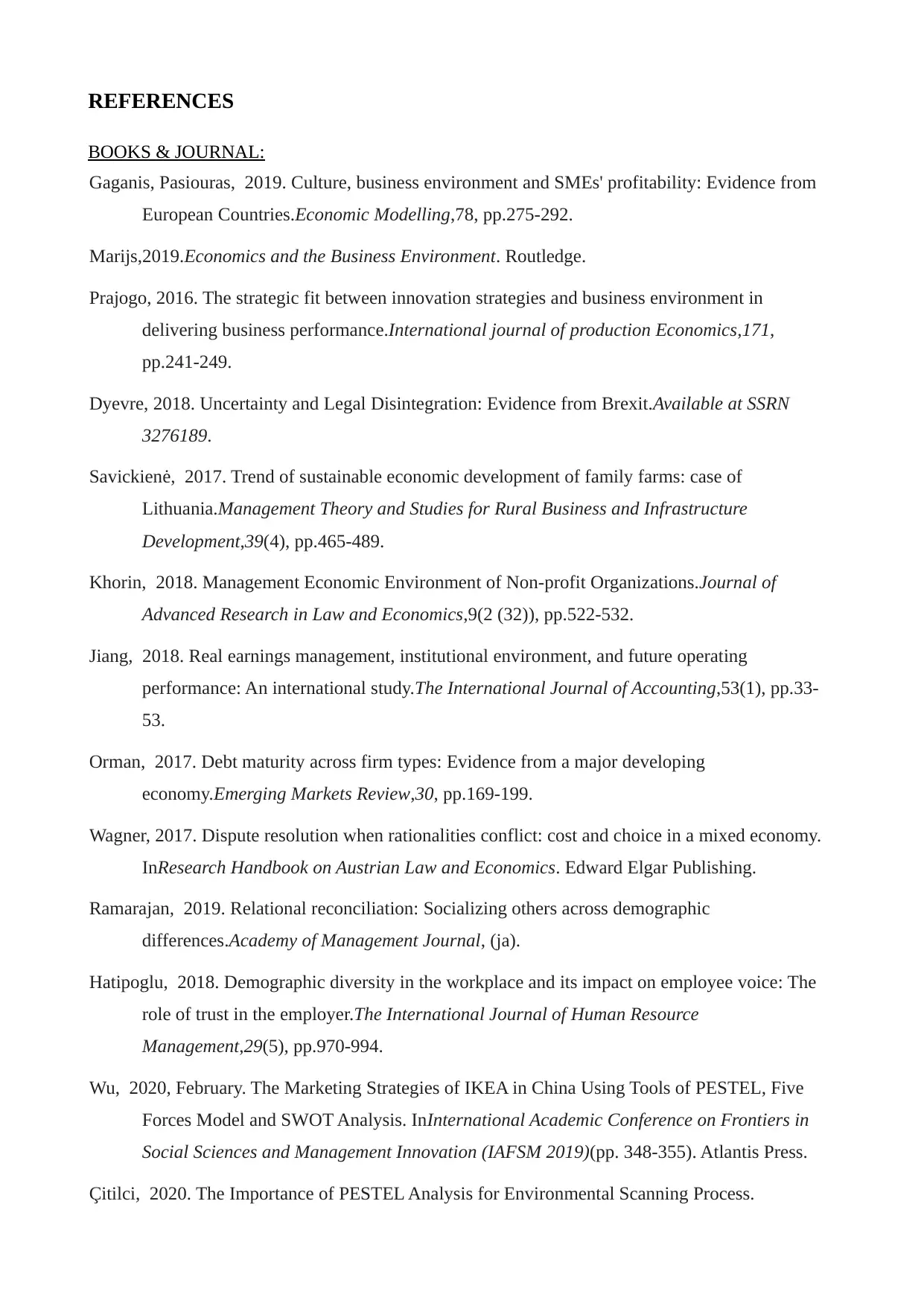
REFERENCES
BOOKS & JOURNAL:
Gaganis, Pasiouras, 2019. Culture, business environment and SMEs' profitability: Evidence from
European Countries.Economic Modelling,78, pp.275-292.
Marijs,2019.Economics and the Business Environment. Routledge.
Prajogo, 2016. The strategic fit between innovation strategies and business environment in
delivering business performance.International journal of production Economics,171,
pp.241-249.
Dyevre, 2018. Uncertainty and Legal Disintegration: Evidence from Brexit.Available at SSRN
3276189.
Savickienė, 2017. Trend of sustainable economic development of family farms: case of
Lithuania.Management Theory and Studies for Rural Business and Infrastructure
Development,39(4), pp.465-489.
Khorin, 2018. Management Economic Environment of Non-profit Organizations.Journal of
Advanced Research in Law and Economics,9(2 (32)), pp.522-532.
Jiang, 2018. Real earnings management, institutional environment, and future operating
performance: An international study.The International Journal of Accounting,53(1), pp.33-
53.
Orman, 2017. Debt maturity across firm types: Evidence from a major developing
economy.Emerging Markets Review,30, pp.169-199.
Wagner, 2017. Dispute resolution when rationalities conflict: cost and choice in a mixed economy.
InResearch Handbook on Austrian Law and Economics. Edward Elgar Publishing.
Ramarajan, 2019. Relational reconciliation: Socializing others across demographic
differences.Academy of Management Journal, (ja).
Hatipoglu, 2018. Demographic diversity in the workplace and its impact on employee voice: The
role of trust in the employer.The International Journal of Human Resource
Management,29(5), pp.970-994.
Wu, 2020, February. The Marketing Strategies of IKEA in China Using Tools of PESTEL, Five
Forces Model and SWOT Analysis. InInternational Academic Conference on Frontiers in
Social Sciences and Management Innovation (IAFSM 2019)(pp. 348-355). Atlantis Press.
Çitilci, 2020. The Importance of PESTEL Analysis for Environmental Scanning Process.
BOOKS & JOURNAL:
Gaganis, Pasiouras, 2019. Culture, business environment and SMEs' profitability: Evidence from
European Countries.Economic Modelling,78, pp.275-292.
Marijs,2019.Economics and the Business Environment. Routledge.
Prajogo, 2016. The strategic fit between innovation strategies and business environment in
delivering business performance.International journal of production Economics,171,
pp.241-249.
Dyevre, 2018. Uncertainty and Legal Disintegration: Evidence from Brexit.Available at SSRN
3276189.
Savickienė, 2017. Trend of sustainable economic development of family farms: case of
Lithuania.Management Theory and Studies for Rural Business and Infrastructure
Development,39(4), pp.465-489.
Khorin, 2018. Management Economic Environment of Non-profit Organizations.Journal of
Advanced Research in Law and Economics,9(2 (32)), pp.522-532.
Jiang, 2018. Real earnings management, institutional environment, and future operating
performance: An international study.The International Journal of Accounting,53(1), pp.33-
53.
Orman, 2017. Debt maturity across firm types: Evidence from a major developing
economy.Emerging Markets Review,30, pp.169-199.
Wagner, 2017. Dispute resolution when rationalities conflict: cost and choice in a mixed economy.
InResearch Handbook on Austrian Law and Economics. Edward Elgar Publishing.
Ramarajan, 2019. Relational reconciliation: Socializing others across demographic
differences.Academy of Management Journal, (ja).
Hatipoglu, 2018. Demographic diversity in the workplace and its impact on employee voice: The
role of trust in the employer.The International Journal of Human Resource
Management,29(5), pp.970-994.
Wu, 2020, February. The Marketing Strategies of IKEA in China Using Tools of PESTEL, Five
Forces Model and SWOT Analysis. InInternational Academic Conference on Frontiers in
Social Sciences and Management Innovation (IAFSM 2019)(pp. 348-355). Atlantis Press.
Çitilci, 2020. The Importance of PESTEL Analysis for Environmental Scanning Process.
Paraphrase This Document
Need a fresh take? Get an instant paraphrase of this document with our AI Paraphraser
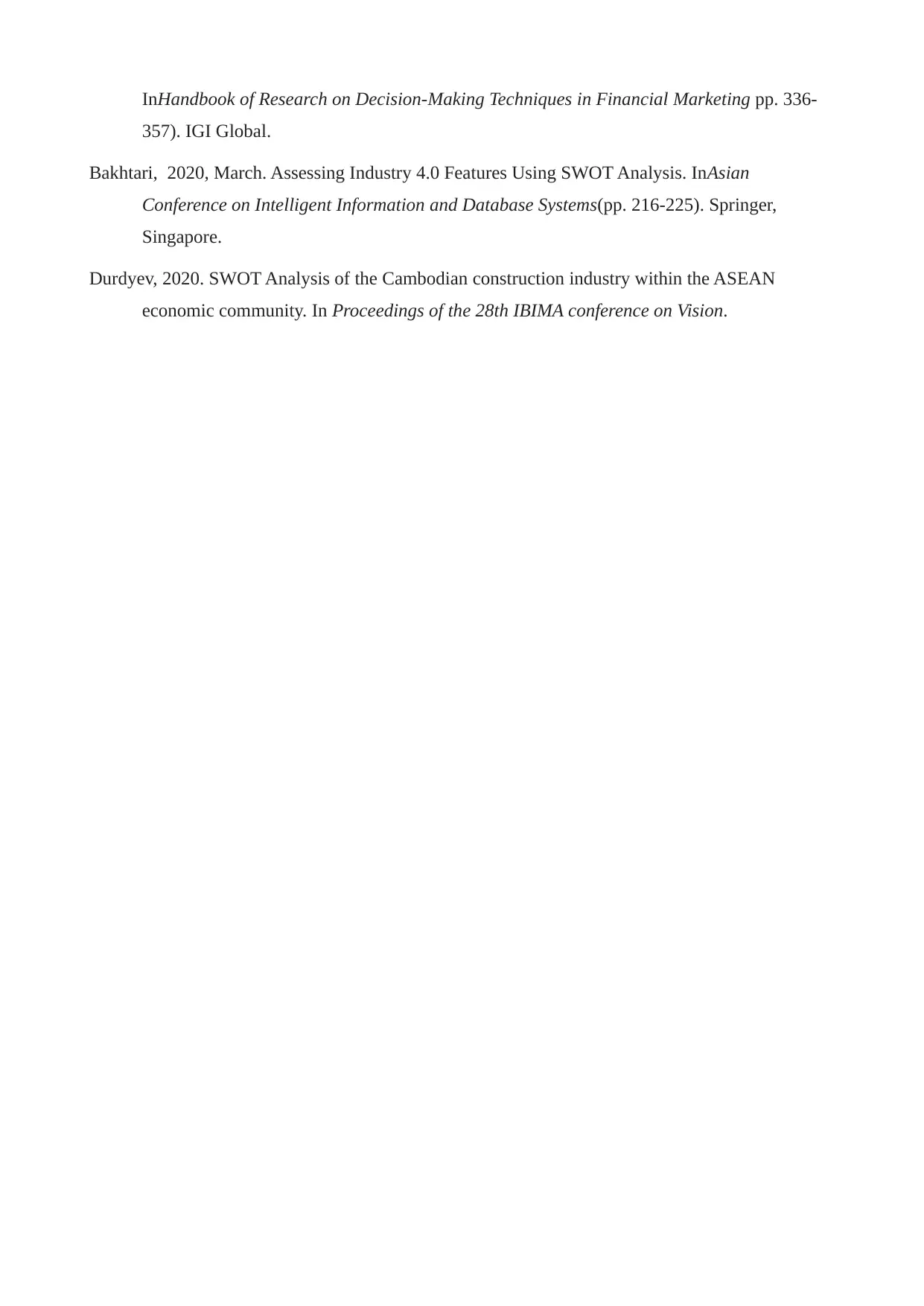
InHandbook of Research on Decision-Making Techniques in Financial Marketing pp. 336-
357). IGI Global.
Bakhtari, 2020, March. Assessing Industry 4.0 Features Using SWOT Analysis. InAsian
Conference on Intelligent Information and Database Systems(pp. 216-225). Springer,
Singapore.
Durdyev, 2020. SWOT Analysis of the Cambodian construction industry within the ASEAN
economic community. In Proceedings of the 28th IBIMA conference on Vision.
357). IGI Global.
Bakhtari, 2020, March. Assessing Industry 4.0 Features Using SWOT Analysis. InAsian
Conference on Intelligent Information and Database Systems(pp. 216-225). Springer,
Singapore.
Durdyev, 2020. SWOT Analysis of the Cambodian construction industry within the ASEAN
economic community. In Proceedings of the 28th IBIMA conference on Vision.
1 out of 11
Related Documents
Your All-in-One AI-Powered Toolkit for Academic Success.
+13062052269
info@desklib.com
Available 24*7 on WhatsApp / Email
![[object Object]](/_next/static/media/star-bottom.7253800d.svg)
Unlock your academic potential
Copyright © 2020–2026 A2Z Services. All Rights Reserved. Developed and managed by ZUCOL.




